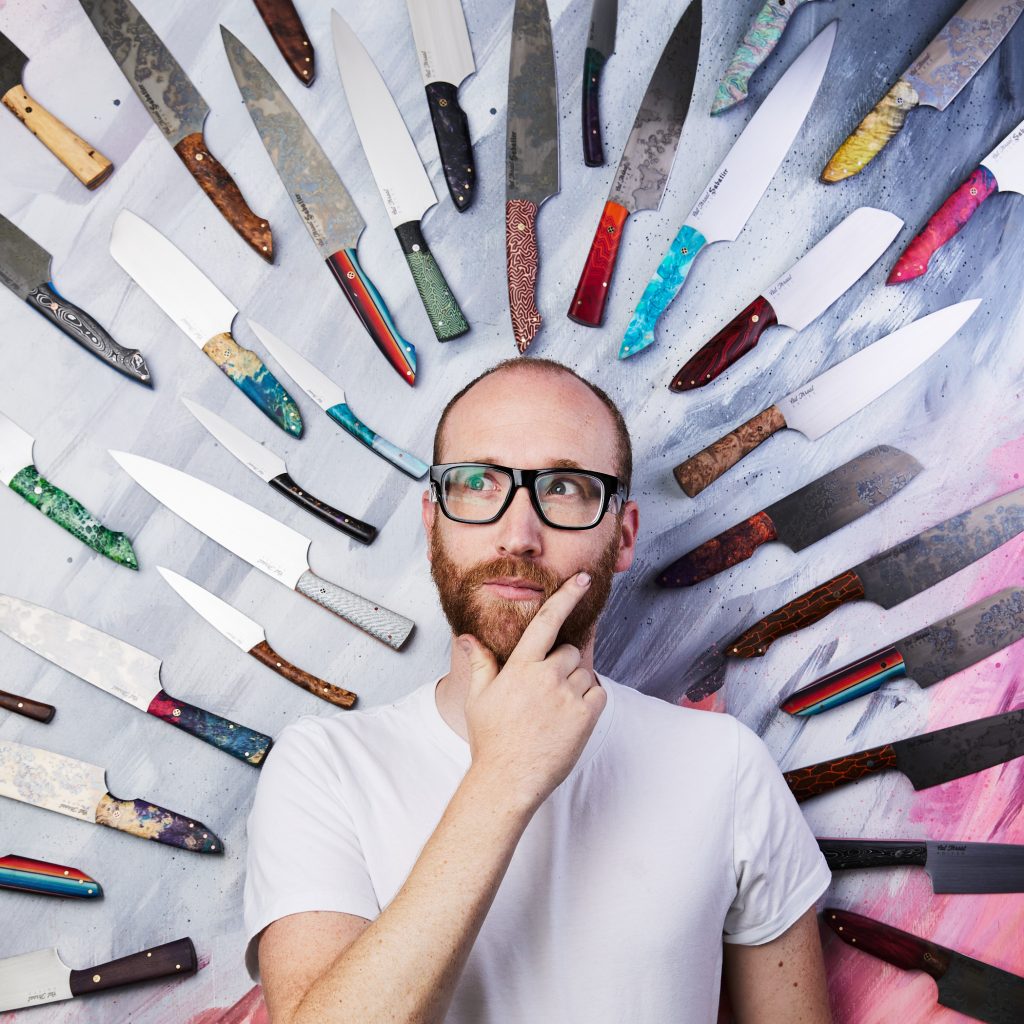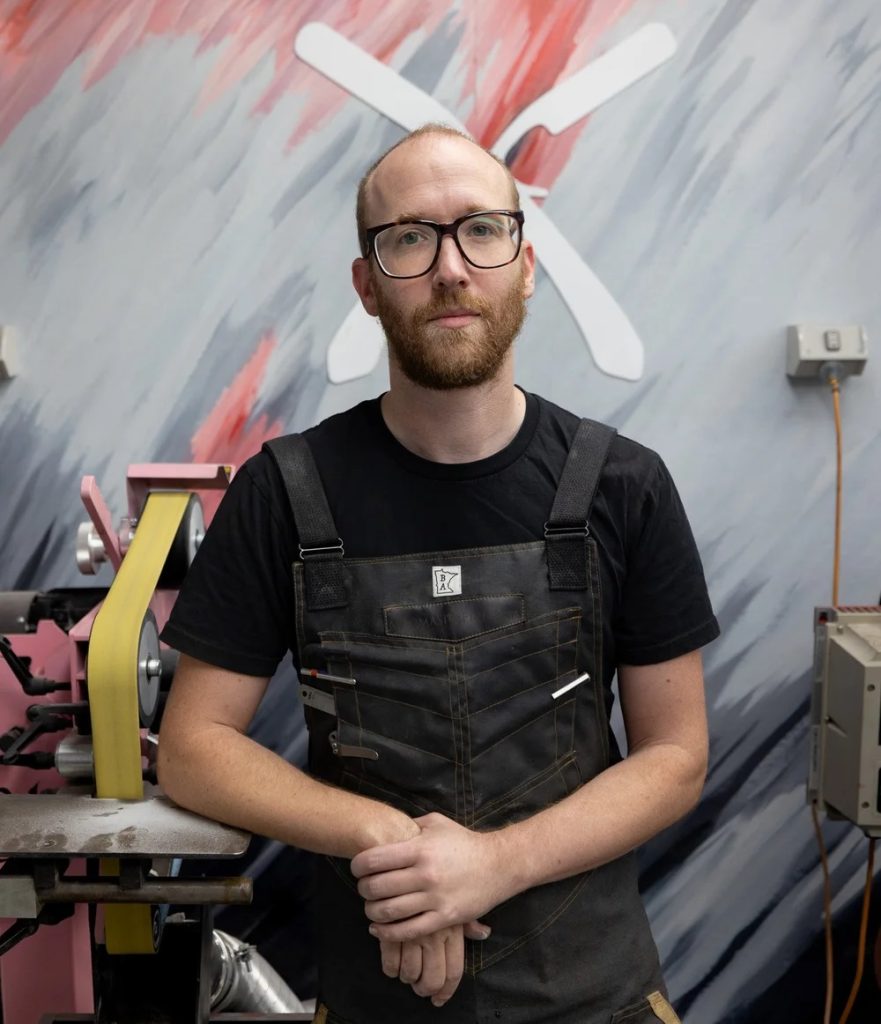
Kitchen Kind #19
Aidan Mackinnon
Founder and Creative Director of Cut Throat Knives
Founder of Cut Throat Knives, Aidan Mackinnon is part of a new wave of bladesmiths redefining what knife making means today. With a focus on premium, handcrafted kitchen tools, his work celebrates precision, style, and enduring quality. We at Turnip Media sat down with Aidan to uncover the passion and philosophy behind his craft—here’s what he shared with us…

Early Spark
I started cooking when I was fifteen. I was obsessed. Jamie Oliver inspired a lot of people; before that, the celebrity chefs weren’t targeted toward my demographic, but he inspired a whole generation. I wanted to cook, and my dad got me the Anthony Bourdain book to try to convince me not to be a chef… It did the opposite.
From Policy to Knives
You’ve got to approach cooking with a level of professionality that I never did — I was just dipping my toes in and following the university route for the rest of it. I ended up working in policy, for the UN in Geneva. I took a knife-making class and really fell in love with it. The process of starting the day with nothing and ending the day with a product is so empowering. A file that exists in the ether is so different from something tangible — something you can hold in your hand, where the material has a story that you become a part of.
Cooking, for me, is how I express love and admiration for people. When my wife gave birth to our first child, I cooked a different dish every day for her for six months. Every single day we had something different, because my wife had brought a life into the world. It was a powerful period — to be so devoted to cooking for that long.
The Beauty of Simplicity
I generally push myself, so settling on one thing is hard, but I would say I fall back on basic but unforgiving recipes. A good pasta pomodoro is a notoriously hard dish to get right — because there’s nothing to it. It’s either brilliant, or just really okay.
A basic stir-fry, too, is hard to get right. I learnt in China, and the guy explained to me that growing up, he was too poor to add more than about two vegetables to a stir-fry. The fundamental triad would be in there — ginger, garlic, spring onion — but beyond that, maybe snow peas and broccoli if you were lucky. On a very special day, you’d have some protein. I like basic dishes where the ingredients sing.
Food as Connection
I feel the act of cooking is the act of love — and that can be for strangers as well. I often have thirty or forty people at the house, some I’ve never met before. I think there’s something really poetic about human meals, about the relationships that can come out of that.
I’ve got a Jewish background. Shabbat every Friday night is big — we have a lot of traditions. Something that forms a big part of these traditions is challah — an eggy loaf that’s been folded and plaited together. Accompanying that, from as young as I can remember, there were pickles, dips, and spreads. As a kid, you always over-stuff yourself with the bread. It’s that good.

Learning From Mum
The nature of these food traditions is that they connect you to other people. I have always cooked with my mum. I’ve got a couple of really formative memories with my dad — important in a different way — but with my mum, she’s an amazing cook. Devoted. Learning the basics from her, like baking (which I always found hard), meant fully embracing the enjoyment.
She took me to cooking classes when I started cooking at around fourteen — and when I look back on it, I realise she didn’t have to do these things for me. She embraced me and my love for cooking.
During COVID, I went down a deep dive trying to create my own challah recipe. My aunt happened to be working on hers at the same time. During the occasional breaks in COVID restrictions, we would meet at family gatherings and trade ideas. Hers was always better.
Here it is:
Neecy’s Challah Recipe (Makes 2 huge Challahs)
INGREDIENTS
- 1kg Bread Flour (Laucke or Lighthouse)
- 1 TBSP Bread improver (Laucke)
- 5TBSP Sugar
- 1/4 Cup Honey
- 2TBSP Dry Yeast
- 2 Cups Lukewarm Water
- 2 Eggs
- 1/2 Cup Veg Oil
- 1TBSP Salt
- + up to 1/2 Cup extra Flour
METHOD
This method uses a mixer with a dough hook. If kneading by hand, knead for a few minutes longer.
Place the flour and improver into the mixer bowl. Create a well in the centre, pour the water into the well, then sprinkle the sugar and yeast over the water.
Start mixing and add all other ingredients except the salt.
As the dough begins to come together, it may feel quite sticky. Gradually add a little of the extra flour at a time until the bowl is clean. Mix for 7 minutes on low speed.
Add the salt, sprinkling it evenly over the dough and underneath as well. Continue to knead for another 7 minutes on medium speed.
Transfer the dough to a well-oiled large bowl, cover with plastic wrap and a tea towel, and place in a warm spot to rise for up to 2 hours.
Turn the dough out onto a floured surface and divide it into however many ropes you plan to plait (3, 4, 5, or 6). Roll the ropes and let them rest for a few minutes. After plaiting, allow the dough to rest for at least 45 minutes before brushing with egg wash and sprinkling with seeds.
Turnip Media recognises the Wurundjeri as traditional owners of the land on which we live and work.
We pay respect to their elders, past, present and emerging.